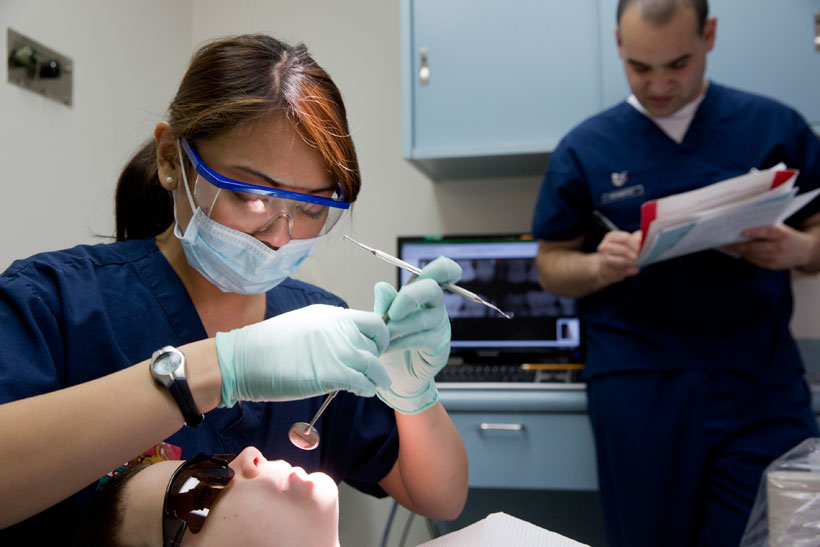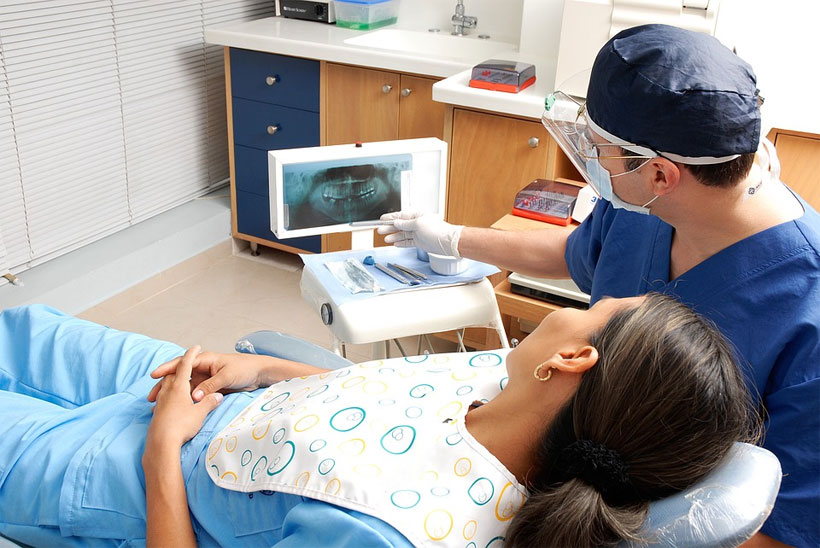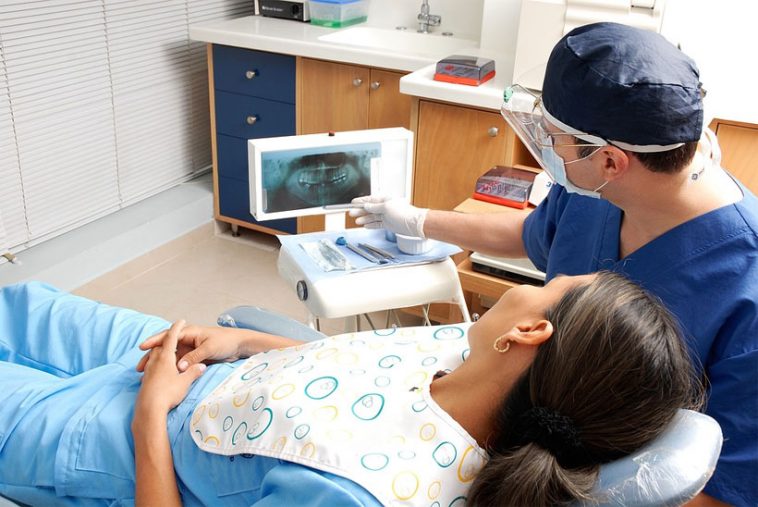- Like
- SHARE
- Digg
- Del
- Tumblr
- VKontakte
- Flattr
- Buffer
- Love This
- Save
- Odnoklassniki
- Meneame
- Blogger
- Amazon
- Yahoo Mail
- Gmail
- AOL
- Newsvine
- HackerNews
- Evernote
- MySpace
- Mail.ru
- Viadeo
- Line
- Comments
- Yummly
- SMS
- Viber
- Telegram
- JOIN
- Skype
- Facebook Messenger
- Kakao
- LiveJournal
- Yammer
- Edgar
- Fintel
- Mix
- Instapaper
- Copy Link
Introduction
 Maintaining good health requires effort in several different areas. For instance, proper nutrition fuels your body to keep energy levels up and exercise helps to maintain muscle mass, strength, and mobility.
Maintaining good health requires effort in several different areas. For instance, proper nutrition fuels your body to keep energy levels up and exercise helps to maintain muscle mass, strength, and mobility.
While these aspects of health are common knowledge, there’s one factor that isn’t emphasized enough: mouth health.
Just like nutrition and exercise, maintaining a healthy mouth is vital to your overall health. Your mouth is home to plenty of bacteria, most of which are harmless.
However, medical doctors and dentists including the Pediatric Dentist in Vineland, agree that the mouth can also act as a portal of entry for infection that can affect the entire body.
Prolonged inflammation in your mouth allows bacteria to enter your bloodstream, which can cause inflammation in other areas of your body, including vital organs.
A Healthy Mouth Can Reduce the Risk of Other Diseases
If you want to reduce your risk of certain diseases, it’s important to maintain a healthy mouth and keep inflammation under control. For example, several studies have found a relationship between gum disease and diabetes.
Salomon Amar, DMD, PhD, told WebMD.com, “When you treat and control diabetes, immediately the condition in the mouth improves. And when you treat periodontal disease, the need for insulin is reduced.” Amar is a professor and director at the Center for Anti-inflammatory Therapeutics at Boston University School of Dental Medicine.
Other studies have linked gum disease to other illnesses like heart disease, respiratory disease, osteoporosis, and rheumatoid arthritis.
According to the Mayo Clinic, poor oral health might contribute to diseases including:
- Endocarditis. This is an infection of the inner lining of the heart chambers or valves.
- Cardiovascular disease. This connection is still undergoing research, but several studies suggest that clogged arteries and strokes might be linked to inflammation caused by oral bacteria.
- Pregnancy and birth complications. Some studies have linked premature birth and low birth weight to periodontitis.
- Pneumonia. Some oral bacteria can enter the lungs and cause pneumonia and other respiratory diseases.
While the connections between specific diseases aren’t concrete, the interconnectedness of oral health and overall health is indisputable.
How to maintain good oral hygiene in a nutshell:
- Establish a relationship with a dentist
The first step toward maintaining good oral hygiene is to find a local dentist and have your teeth cleaned regularly.
Get online and do a quick search for a reputable dentist in your area. Look for a directory of dentists to choose from. For example, if you’re in Maryland and need a dentist in Bethesda, HealthGrades.com will give you access to several dentists and patient reviews.
- Brush and floss daily
The obvious task is to routinely clean your mouth by flossing and brushing daily. Ideally, you should floss and brush after every meal. If that’s not possible, brush your teeth in the morning and floss and brush before bed. Don’t skip the morning brush. Bacteria grows in your mouth overnight and that’s what causes bad breath.
- Use mouthwash daily
Mouthwash isn’t just for fresh breath. Mouthwash is marketed as a way to kill bacteria and bad breath, but it serves another important function. Swishing mouthwash vigorously will dislodge food particles from between your teeth. If you can’t bring yourself to floss after every meal, using mouthwash will help.
- Use a gum massager
Your toothbrush and a pack of floss aren’t the only tools you need in your bathroom medicine cabinet. Another useful tool to have is a gum massager. A gum massager has a long handle with a small rubber tipped point on the end. It almost looks like a pick, but the point is flexible.
If you have a deep gum pocket, you can use a gum massager to clean it out. For instance, say you have a wisdom tooth that never grew in completely. The gum surrounding the tooth will act like a pocket and collect food particles. One quick swipe with a gum massager will remove the food particles and keep your gums healthy.
- Swish with coconut oil
If you don’t like the taste of mouthwash, swish with coconut oil instead. Coconut oil will dislodge food particles just like mouthwash and since it has antibacterial properties, it will kill the harmful bacteria in your mouth. Swish vigorously for about 10-20 minutes and be sure to spit it out into the trash when you’re done. Don’t swallow it and don’t spit it down the drain or it will harden in your pipes.
Strategies for Healthy Teeth
Taking good care of your teeth is paramount from when you’re young till you get old.
The basics of taking good care of your teeth are brushing, flossing your teeth on a daily basis, while also ensuring that you see your dentist frequently.
Water flossers and daily fluoride mouth rinses will also help you maintain healthy gums, teeth, and a beautiful smile.
Lack to take good care of your mouth can lead to serious problems such as challenges in eating, speaking, and more.
You are, hence, required to ensure that you be disciplined and follow the best ways of maintaining your mouth’s health.
There might be some variations in proper mouth care, from when one is a kid to when they become an adult, as discussed below:
Mouth Care Tips for Children and Infants
Your child will have an almost complete first set of teeth when they are born, even though the teeth will not have appeared from the gums.
These teeth are significantly important as they will enable your young one to start speaking and chewing food as soon as they emerge from the gum. As if that’s not enough, they will be markers to where the permanent teeth are to be formed.
The following tips should be quite beneficial to achieving better health for your young one’s mouth and teeth:
- Clean your young one’s teeth using a washcloth once they emerge, and advance to a children’s toothbrush once they are bigger.
- For the young ones under the age of 2 years, water should be used, instead of toothpaste.
- As the young one becomes older, don’t always give them sweet, sticky snacks to chew, encourage them to eat low-sugar snacks such as cheese, fruits, and such.
- You shouldn’t leave your child to sleep with a bottle, as that may leave juice or milk sitting that may lead to cavities referred to as “baby-bottle tooth decay.”
- As they continue growing, show them how to brush their teeth properly and let them know the importance of doing so regularly.
- Make regular visits to the dentist so that your young one has a frequent dental checkup.
Mouth Care Tips for Teens
As a teen, there can focus on several things to keep your teeth looking clean and healthy. Those things include:
- Brushing your teeth at least twice, every day with fluoride toothpaste to prevent cavities and keep them strong.
- Flossing your teeth at least once each day.
- Avoiding smoking or chewing tobacco, as it could lead to teeth stains and worse even cause cancer.
- Using protective headgear for any contact sports.
- Making the best use of Mitcham Dental and other sites to source for dental advice and other services that you might need.
- Seeing a dentist after every 6 months for checkups.
Mouth Care Tips for Adults
Never cease to take good care of your teeth even as an adult, as that will exempt you from tooth loss, gum pains, and several other problems. The things that you should do include:
- Using fluoride toothpaste to brush your teeth at least twice on a daily basis.
- Flossing your teeth at least once each day.
- Avoiding chewing or smoking any tobacco products.
- Seeking advice from doctors about any medicine that may damage your mouth.
- Inspecting your mouth regularly for any abnormalities.
- Making an effort to see a dentist after every 6 months.
The Bottom Line
Proper mouth health care starts by making small crucial efforts on a daily basis, but some people ignore such efforts. If you want your teeth to remain in their positions for long, never underestimate any efforts aimed at improving and maintaining good health, as all efforts matter.
Best Practices for Strong and Healthy Teeth
 According to the professionals at Subiaco Dental Practice, “Healthy and strong teeth require constant care.”
According to the professionals at Subiaco Dental Practice, “Healthy and strong teeth require constant care.”
Bad dental hygiene, stained teeth, and cavities can make you hesitant to smile or laugh in public, thereby affecting your self-confidence.
Dental problems can also lead to bleeding, staining, or even tooth loss affecting your day-to-day life.
All such problems can be prevented with proper dental care by a professional.
Listed below are some of the best practices to keep your teeth strong and healthy.
Brush Regularly but Not Aggressively
We all know that brushing teeth twice a day,especially before going to bed, is necessary toremove plaque and bacteria. However, brushing can be effective or ineffective depending on the technique you use. The right method is to brush in small circular motions and make sure to brush all areas of your teeth, including front, back, and top. The process should take 2 to 3 minutes.
Avoid back and forth motions to brush your teeth. Using a hard-bristled toothbrush or hard brushing can damage your tooth enamel and gums. Aggressive brushing can also result in tooth sensitivity, gum erosion, and permanent damage of protective enamel on your teeth. Therefore, always use a toothbrush with soft bristles, and change your brush when the bristle ends start to look frayed.
Floss At least Once a Day
The brush cleans the surface of teeth, but it’s not effective to remove food particles from the spaces between teeth. Flossing is necessary to get rid of the food residue stuck between the teeth. It also helps to prevent bad breath by removing the trapped debris and food. It’s recommended to push the floss gently all the way down to the gum line for removing the accumulated plaque. Make a habit of flossing properly at least once a day.
Use Fluoridated Toothpaste
Fluoride is an essential ingredient to avoid tooth decay and cavities. Make sure your toothpaste contains fluoride. Evidence suggests that an absence of fluoride can cause tooth decay despite proper dental care. Fluoride protects your enamel and acts as a defense against tooth decay. It works by fighting the germs that can cause cavities. Therefore, look for a fluoridated toothpaste.
Don’t be Lazy to Visit a Dentist
Do your best for your dental hygiene and leave the rest to the. You should visit a dental care expert like Dr. Bach orthodontist for a full oral checkup and teeth cleaning. It’s necessary to visit a dentist if you suffer from tooth sensitivity, cavities, or teeth stains. There may be some dental problems you cannot identify on your own. It’s suggested to see a dentist every six months for a thorough dental checkup. A dentist will remove any hardened tartar or plaque during a routine examination. This practice prevents cavities and other serious dental problems from occurring in future.
Limit Smoking and Alcohol Intake
Avoid smoking for the sake of your dental and oral health. Sweets and sugary foods can further increase the risk of tooth decay or cavities. Tea or coffee can also cause yellowing of the teeth. It’s also necessary to limit the intake of alcohol and soda as too much consumption can reduce the calcium level of the body, causing gum disease and tooth decay. If you have to drink soda or alcohol, do it with a straw to prevent the drink from having direct contact with your teeth.
Four Ways to Whiten Your Teeth at Home
 Having stained, yellow and dull teeth can be a major fear for some people. Treating already infected teeth can be costly and painful, the idea of which has made sure that most of us end up taking care of our teeth to prevent them from getting infections and stains.
Having stained, yellow and dull teeth can be a major fear for some people. Treating already infected teeth can be costly and painful, the idea of which has made sure that most of us end up taking care of our teeth to prevent them from getting infections and stains.
However, there are a few ways of making sure that your teeth are always as white and healthy as they can be. If you are wondering about some of the fastest and easiest ways of maintaining your teeth while at home, here are a few tips to help you out. After all, we all want to have a beautiful and a confident smile, right?
Activated charcoal
Activated charcoal is one of the most popular natural teeth whiteners recommended as it has impressive results. You do not need to be terrified of the black color of the charcoal while using it as when you rinse it the higher possibility is that your teeth will turn out whiter than before. Activated charcoal has high absorption qualities, and it binds to materials like tannins that stains your teeth making the teeth to turn yellow or brown.
Use baking soda and Lemon juice paste
Baking soda, officially known as Sodium bicarbonate, is a mildly abrasive substance which can be used to adequately scrub away the stained surface of the teeth to retain a whiter shade. Baking soda is highly alkaline, making it a great option to balance the pH level in your mouth if you tend to eat acidic foods often, or have an acidic mouth.
Lemon juice is recognized as a natural bleach, and that is why it is used in creating this paste. The lemon juice is acidic and using baking soda neutralizes its acidity making it a great combination. All you need to make this paste is several teaspoons of baking soda, water or enough lemon juice to form a paste and a toothbrush.
Use Salt, Strawberry, and baking soda paste.
Strawberries are rich in vitamin C that can help to break down plaque which is usually the leading cause of teeth turning yellow. Berries also contain Malic acid which works as a stain remover. Salt in the paste as abrasive and it physically scrubs away the plaque and stains while the baking soda adds an extra finishing touch. All you need to create this paste is 1-3 strawberries (large), a pinch of salt, and 1/2 teaspoon of baking soda.
You will need to mash the strawberries before adding the salt, and baking soda then brushes using the paste for five minutes.
Use teeth whitening kits.
There are various teeth whitening kits that you can also use and have proven to work adequately. With technology evolving, different teeth whitening products are being produced. Some of them use ultraviolet light which is widely used by dentists to speed up the teeth whitening process. These kits do not have lengthy procedures on using them, a quality that makes them more popular every day. If you prefer using the whitening kits to other methods you can check more here.
The Bottom Line
Our teeth are very precious to us, and we should take care of them the best we can. The teeth whitening procedures above will not only help you in keeping your teeth white but also help your teeth to last longer and maintain their strength. It will also reduce costs of having to visit the dentists often which is too expensive.
Tips for Seeking Orthodontic Consultation and Treatment
 “Correcting your teeth and jaw alignment issues can improve not only the appearance of your smile, but more importantly position the teeth and jaw better for function and longevity for healthy living,” says Smile Central.
“Correcting your teeth and jaw alignment issues can improve not only the appearance of your smile, but more importantly position the teeth and jaw better for function and longevity for healthy living,” says Smile Central.
If you are considering seeking out orthodontic treatment to improve the alignment of your teeth or that of a loved one, your first step should be to research orthodontics so that you are prepared with the right questions to ask the orthodontist before undergoing treatment.
Once you’ve done your due diligence and have a better understanding of what is in store for you from both a health and financial perspective, it’s then and only that you will want to start searching for a quality orthodontist in your area.
Finally, you will be scheduling a consultation with the orthodontist and can address any of the questions or concerns gathered during your research. You will also quickly determine from your initial consultation if the orthodontist is a good fit for you.
Finding an orthodontist who resonates with you on a personal and professional level is important since you’re likely going to be seeing them quite a few times over the next 18 to 24 months once treatment begins.
Remember, a healthy smile isn’t going to happen overnight so you will be thanking yourself later if you are patient through the process and have chosen an orthodontist that you will be looking forward to seeing.
How to Find a Quality Orthodontist
Not all orthodontists are created equal so it’s important that you do some research before just calling any up and scheduling your initial consultation. After all, orthodontists are still only human so their skills, experience, and personality will differ from the next.
Here are some tips to help you find a quality orthodontist and some of the questions that you’re going to want to ask them during the initial consultation.
Finding a Quality Orthodontist and Asking the Right Questions
Word of mouth from friends or family and customer reviews are going to be your best friend when it comes to finding a quality practitioner. Here are some popular sources to help you find a orthodontist that will resonate with your needs.
Family & Friends
One of the best ways to find a quality orthodontist is to ask your friends and family if they’ve had any work done. Personal recommendations are one of the best indicators to land a good practitioner. If they have nothing but good things to say about the orthodontist that straightened their child’s teeth or their own, that’s great validation that you’ll likely experience quality care as well.
Dedicated Orthodontist Directory
Specialized directories dedicated to finding an orthodontist such as the American Association of Orthondontists can be a great resource to find a quality, board certified practitioner. There are quite a few of these directories so be sure to Google around. Some are for dedicated geographic regions and others span the globe.
Google Maps
If your family and friends had no recommendations for you, you are most likely going to be using Google or your favorite search engine to find an orthodontist. Google Maps is a great place to search your local area for a quality orthodontist. You can read hundreds if not thousands of reviews online. TIP: Don’t just read positive reviews, negative reviews can tell you a lot as well. But don’t let one or two negative reviews turn you off if the positive reviews far outweigh them; go with your gut!
Yelp, Foursquare, TripAdvisor, Angie’s List or Other General Directory
If you prefer general business directory sites such as one of the above, you can also find some great practitioners by reading reviews there. See what other patients have to say about their level of care and overall experience.
Questions to Ask Your Orthodontist
Asking the right questions is very important when attending your initial orthodontic consultation. If you have any fears about treatment, this is the time to get them out of the way. A quality practitioner should make you feel comfortable and address all your questions and concerns.
Here are some of the questions to ask your “potential” orthodontist:
- How much does treatment cost, what payment options do you take, and do you accept insurance?
- Am I a good candidate for orthodontic treatment, and if so, what’s my treatment plan going to look like?
- How many appointments will be required for the entire duration of treatment?
- Will I need to have any teeth removed, wear headgear or require anything else specialized?
- Is my treatment going to be painful?
- Are you board certified?
The Bottom Line
Seeking orthodontic treatment doesn’t have to be a difficult process. While getting your teeth straightened can be a long and drawn out procedure itself, the rewards are worth it ten times over. You will not only take your smile to celebrity status, you’ll improve your overall teeth and gum health which means far less dentist visits in the future!
That being said, it’s important to choose an orthodontist that you like on not only a professional level but a personal one as well. You definitely don’t want to feel like a piece of meat during your many follow-up sessions over the next 12 to 18 months or more. If your orthodontist doesn’t welcome you with a smile each and every visit, they don’t deserve your business.
Using the many on and offline avenues at your disposal to find a potential quality orthodontist and asking them the right questions during your initial consultation will ensure that your overall treatment is going to be a pleasant experience.
How a Dental Examination Can Diagnose Underlying Health Problems
 It’s quite obvious that a visit to the dentist might diagnose dental issues and diseases, but it’s often overlooked that dental specialists can also observe symptoms for underlying health issues that might not be directly connected with periodontal health.
It’s quite obvious that a visit to the dentist might diagnose dental issues and diseases, but it’s often overlooked that dental specialists can also observe symptoms for underlying health issues that might not be directly connected with periodontal health.
Here, we will discuss some examples to keep in mind:
Oral Infections
Your dentist might spot signs of oral infections, which can occur in your gums, root of a broken tooth, tongue, and mouth tissue. Oral infections might be caused by trauma, bacteria,virus, chronic canker sores, and various other reasons.
Symptoms that might indicate oral infections are pain (mild to severe), redness, swelling, fever (including spots in your mouth that are hot to the touch), and pus drainage. Oral infections can spread to other areas of the body—and might cause terminal diseases— so it’s important to treat them immediately.
Diabetes (Type 1 and 2)
Various oral conditions like loose teeth, gum inflammation, and bleeding gums might indicate diabetes type 1 and 2. A strong indicator, however, is when there is consistent dryness in the mouth, which is a symptom of overly high or overly low glucose levels.
When a dentist observe these symptoms, they might recommend the patient to take a test for diabetes—if the patient hasn’t diagnosed with one—. This can allow an early detection for diabetes or prediabetic condition that hasn’t progressed to type 2, allowing earlier treatment for the patient.
Heart Conditions
Oral condition can indicate the presence of various heart diseases. When a good number of teeth are loose, combined with gum inflammation, the patient might have an underlying heart condition, or at risk of developing one. In fact, oral health and cleanliness might be the cause of various heart conditions, when too many bacteria accumulates in the mouth, the bacteria can enter the blood flow and get carried to the heart.
Patients with loose teeth and gum inflammation/abscess should get themselves treated immediately to avoid risks of heart diseases.
Bulimia
Bulimia is a term of serious eating disorder characterized by self-induced vomiting to compensate the previous binge-eating.
Bulimia can be life-threatening due to the serious emotional damage, and can severely damage the teeth. Repeated self-induced vomiting allows acids from the stomach to linger on your teeth and gums, and also exposes the gums and teeth to stomach bacteria. These can allow wears and chips on the tooth enamel.
Dentists might recognize the damages caused by bulimia, and the patient might be referred to a doctor or psychiatrist.
Stomach Reflux
Reflux issues, including nighttime reflux can damage the teeth. This will especially affect the upper back molars, causing worn enamels, cavities, and weakened tooth in general.
Reflux issues might also increase the risks for stomach and esophagus cancer. So, in the case when your dentist see severe damages caused by reflux issues, they might refer you to a physician.
Osteoporosis
Osteoporosis is a health condition where the bones are gradually weakened, and often happens to elderly people as well as women who have gone through menopause.
A good sign for osteoporosis is the receding gum line, indicating that the bone that supports your teeth are weakened. Osteoporosis might also cause loose teeth.
When the dentist see these symptoms on those with a higher risk for osteoporosis, they might recommend getting a bone density test and will refer you back to your physician.
HIV
In pediatric patients, overly dry mouth might be caused by the swelling of the salivary gland. The presence of virus-induced oral lesions like herpes (simplex and zoster), oral candidiasis, and HPV, among others in child patients might indicate HIV.
Adult patients with HIV might have various oral conditions like colored spots on the tongue, lesions, oral warts, and severe oral ulcers.
Obviously having these symptoms alone might not necessarily mean you have HIV, but when a dentist spot these signs on patients with risky lifestyles (or children with HIV parent), the dentist might recommend getting an HIV test.
Dementia
Dementia is a medical term referring to memory loss and mental confusion where the patient is unable to properly remember time and events. Poor dental hygiene is often linked to dementia, because the patient might not practice proper oral hygiene habits due to memory loss, and might not be able to follow suggestions.
On the other hand, a recent study at the University of California have suggested that not brushing your teeth regularly—at least once a day, but ideally twice a day— might increase dementia risk by up to 65%. Therefore, it is wise to maintain proper oral hygiene practices since earlier in life.
Stress
High level of stress might show in your mouth, where one of the most common symptoms is damages due to frequent grinding of your teeth—called bruxism—-. We often grind our teeth subconsciously during high level of stress, and this might occur during our sleep.
In this case, the dentist might recommend a night guard to protect your teeth, and might refer you to a psychologist or psychiatrist in severe cases.
Parkinson’s Disease
Consistent and high level of mouth dryness can be a sign of Parkinson’s disease development. Saliva helps break down various bacteria, which can include bacteria that will cause Parkinson’s disease. Mouth dryness can be the side effect of various medications, but if you are not currently taking one, the dentist might recommend some sort of saliva substitute to counter the issue.
The Bottom Line
Regular visits to your dentist can help in finding early signs for various health issues beyond dental and oral diseases. The dentist might provide health recommendations, or refer you to physicians and health specialists before the condition becomes more severe.
Conclusion
When your mouth is clean, your whole body will be in a better state of health. Maintaining your mouth health is an essential part of maintaining your overall health and well-being.
If you follow the tips in this guide, you’ll be on your way to not only a prettier smile, but dramatically improved physical and mental health.
In conclusion, don’t neglect your teeth! ?
About Shannon Clark
Shannon holds a degree in Exercise Science and is a certified personal trainer and fitness writer with over 10 years of industry experience.


